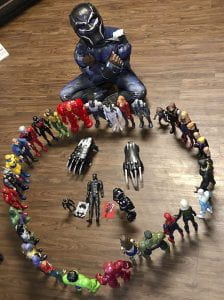
The Legacy of Chadwick Boseman
Written by Ashley Austin
As a black child growing up in a world focused on white Western beauty, seeing someone of my complexion or darker in media was an event that was few and far between. To get even the slightest bit of representation, I would have to spend my time watching re-runs of shows like The Fresh Prince of Bel-Air, Martin, and My Wife and Kids. Although these shows gave me a place to feel like I belonged, I still felt like I, a black person, was being ostracized from the world that white people lived in–a world where they got to see themselves as heroes, everyday people, and supernatural beings, while I had to make do with stereotypes and what Hollywood thought black people were. As I grew older, I began to accept that as a minority, I might not be able to look at the people in television shows, movies, or characters in novels and books and see myself within them. I essentially came to terms that this material was not made for people like me. My willingness to accept this “fact” was shattered on February 16, 2018, when Black Panther was released, spearheaded by the lead actor, Chadwick Boseman.
Throughout my life, from childhood to young adulthood, I’ve never seen a Hollywood or Western media show with a genuine interest in having black people as lead roles unless they were pursuing projects that spotlight directly onto black pain. It seemed like they were only interested in the stories we had to tell about slavery, gang violence, or what it’s like “living in the hood.” The entertainment industry never realized that black people, both young and old, experience other moments in life. When Black Panther came out, black people gained a new opportunity to see themselves in a different light. We saw ourselves as heroes instead of thugs and as royalty instead of slaves. When little black boys and girls look at characters like Captain America or Ironman, they just see another protagonist. However, when I saw those same little black children look up to King T’Challa with stars in their eyes and the widest grins on their faces, I knew that they saw themselves for the very first time. Being able to witness children who have my skin color finally get the representation they need, the representation I never had, is a gift that means so much more than mere words can ever describe. Thanks to the cast of Black Panther, and the late Chadwick Boseman, black children have a role model to look up to. King T’Challa is an influential character to dress up as on Halloween and a unforgettable hero to imitate.
For two years, I did not know how to put my appreciation for Black Panther into words. I do know my actions showed how much I loved it, as I saw it twice in theaters and streamed it multiple times from home, and believe it is one of the most comforting pieces of media I’ve seen. Unfortunately, on August 28, 2020, the movie’s lead actor, Chadwick Boseman, died after a long battle with colon cancer. After hearing the news, I was hurt and lost, but the emotion I felt most of all was fear. I feared that with the loss of the most prominent, modern-black actor, black children would lose the first role model they’ve had in a long time. With respect for Chadwick Boseman and the legacy he left behind, Hollywood and Western media should provide a space for more black artists and actors to tell their stories. Thus, allowing the next generation of black children to grow up in a world where they feel they belong.
Unfortunately, on August 28, 2020, the movie’s lead actor, Chadwick Boseman, died after a long battle with colon cancer. After hearing the news, I was hurt and lost, but the emotion I felt most of all was fear. I feared that with the loss of the most prominent, modern-black actor, black children would lose the first role model they’ve had in a long time. With respect for Chadwick Boseman and the legacy he left behind, Hollywood and Western media should provide a space for more black artists and actors to tell their stories. Thus, allowing the next generation of black children to grow up in a world where they feel they belong.